Orca attacking boat near Scotland marks first in North Sea, following Iberian coast incidents
An orca hit a seven-ton yacht carrying a 72-year-old multiple times on Monday off the Shetland Islands in Scotland, the sailor told The Guardian.
Retired Dutch physicist Dr Wim Rutten said he was sailing solo from the town Lerwick to Bergen, Norway, according to the Guardian. While fishing for mackerel off the back of the boat, Rutten said he came face to face with an orca that he initially saw through the clear water. The mammal soon repeatedly rammed the stern of the boat.
“What I felt most frightening was the very loud breathing of the animal,” Rutten told the Guardian.
The University of Twente professor said the whale stayed behind the boat and then disappeared before returning faster two or three times and later circling him, according to the Guardian. He added the mammal created “soft shocks” through the aluminum hull.
Orcas attacking boats: Spain's coast are seeing more killer whales touch, push and even turn vessels

Incident follows aggressive behavior near Spain, Portugal
Rutten said he immediately thought of the recent orca attacks on Spanish and Portuguese coasts . The Strait of Gibraltar waters were home to 20 orca incidents last month, according to the Atlantic Orca Working Group and orcas have sunk three boats in Southern Europe since last summer.
The Atlantic Orca Working Group reported over 500 orca boat interactions from 2020 to 2023 yet Rutten’s encounter marks the first recent incident reported in the northern seas.
“Maybe he just wanted to play. Or look me in the eyes. Or to get rid of the fishing line,” Rutten said.
USA TODAY has reached out to Rutten for additional comment.
Experts say the orcas could be teaching each other to adapt this behavior. Juvenile Iberian killer whales — a "unique subpopulation of killer whales that lives in the northeast Atlantic," — were first documented touching, pushing, and even turning vessels, including some fishing and inflatable boats, in 2020, according to research group GT Orca Atlántica.
Andrew Trites, professor and director of Marine Mammal Research at the University of British Columbia, told CBS News the reason for the attacks remains to be an “unprecedented” mystery. Trites said something is positively reinforcing the orcas’ behavior suggesting that it’s possible they’re engaging in form of whale “play” or that they’re reacting to traumatic boat injuries.
"Yes they're killer whales. And yes their job is they're the apex predator in the ocean. However, there's never been a documented case of an orca attacking and killing a human being," whale expert Anne Gordon told USA Today in May, adding that the attacks are isolated incidents. "In normal circumstances there is absolutely zero threat to humans in a boat."
Experts recently gathered to address an "urgent need for specific actions based on international coordination between administrations, mariners and scientists to prevent future damage to people, orcas and vessels," GTOA said.
Cetacean clash: Photos capture group of orcas attacking a gray whale calf along the Oregon Coast
Orca attacks on boats appear to be 'leapfrogging' across oceans as a yacht is rammed by killer whale north of Scotland
- An orca repeatedly rammed a yacht in the Shetland Islands, a sailor told the Guardian.
- The attack follows a series of orca incidents around the Iberian peninsula.
- The "fad" may be "leapfrogging through the various pods and communities," an expert said.

An orca attacked a yacht off the Shetland Islands coast in the North Sea earlier this week, as the aggressive incidents involving killer whales show signs that it could be spreading across the oceans.
Previous orca attacks on boats occurred 3,000 miles away, off the coasts of Portugal and Spain.
Dr. Wim Rutten was sailing from Lerwick, Shetland, an island 400 miles off the north coast of Scotland, to Bergen, Norway, on Monday when an orca suddenly appeared and rammed the stern of his seven-ton yacht, The Guardian reported .
Rutten told The Guardian that the orca repeatedly hit the ship, sending "soft shocks" through the hull. It is the first known orca attack on a boat in the North Sea.
The 72-year-old Dutch physicist, an experienced sailor, said he had heard about orca incidents around Portugal, adding that he found the loud breathing of the orca the "most frightening."
He said the animal kept behind the boat, disappeared, but then "came back at fast speed, twice or thrice, and circled a bit."
Related stories
"Maybe he just wanted to play. Or look me in the eyes. Or to get rid of the fishing line," he added.
It seems the trend has now spread further, with one expert studying orca pods off the Scottish coast telling The Guardian that it was feasible that North Sea orcas were learning from southern orca populations.
"It's possible that this 'fad' is leapfrogging through the various pods/communities," Dr. Conor Ryan, a scientific adviser to the Hebridean Whale and Dolphin Trust, told The Guardian.
Similar behavior has been regularly seen in killer whales off the coast of the Iberian peninsula, and experts say orca interactions with vessels have been increasing since 2020, Insider previously reported .
While many boat interactions with orcas in the area have been harmless, killer whales have increasingly rammed and even sank boats .
The exact reason behind the behavior remains unclear, but some experts believe that a traumatized female orca called White Gladis may be behind the trend, with other killer whales learning and imitating the aggressive behavior from her.
The marine animals are "so highly intelligent" they can learn from each other very quickly, John Hargrove, a former SeaWorld orca trainer, also said recently while predicting that the attacks would continue escalating.
The rising number of incidents has left researchers concerned for sailors' safety and the dwindling orca population around the Iberian peninsula .
- Main content
Orca Rams Into Yacht Near Scotland, Suggesting the Behavior May Be Spreading
The incident occurred roughly 2,000 miles away from the recent encounters near Spain and Portugal
/https://tf-cmsv2-smithsonianmag-media.s3.amazonaws.com/accounts/headshot/SarahKuta.png)
Daily Correspondent
:focal(1468x964:1469x965)/https://tf-cmsv2-smithsonianmag-media.s3.amazonaws.com/filer_public/ae/f5/aef54c0f-0898-4c4f-824b-fd24fa9f2481/gettyimages-521636600.jpg)
Orcas have been ramming into ships off the coasts of Spain and Portugal and making headlines worldwide, but until now, the behavior appeared contained to that one population. Last week, however, one of these black-and-white mammals slammed into a yacht between Scotland and Norway, some 2,000 miles away from the Iberian orcas.
Though scientists don’t quite know what to make of the recent incident, they say it might mean the behavior is spreading. This is believed to be the first known orca-boat encounter in northern waters, as Philip Hoare and Jeroen Hoekendijk report for the Guardian .
On June 19, Dutch sailor Wim Rutten spotted an orca in the waters of the North Sea while traveling east from the Shetland Islands of Scotland. Rutten, 72, was using a single line off the back of the boat to fish for mackerel, when seemingly out of nowhere, the orca rammed into the stern of his seven-ton, aluminum hull yacht.
The creature then proceeded to hit the vessel multiple times. It swam behind the boat and appeared to be searching for the keel, or the main structural support that runs along the bottom of a boat’s hull from front to back. The orca got so close that Rutten could hear its “very loud breathing,” he tells the Guardian .
“Maybe he just wanted to play,” he adds to the publication. “Or look me in the eyes. Or to get rid of the fishing line.”
Though the incident shook him up a bit, Rutten made it home safely.
Scientists are intrigued that this behavior occurred so far away from the Iberian orcas. One possible explanation is that the North Sea orca was a juvenile that simply got curious about the fishing line coming off the back of Rutten’s boat. However, the behavior could have spread from the Spain and Portugal subpopulation , perhaps transmitted by very mobile orcas.
“It’s possible that this ‘fad’ is leapfrogging through the various pods/communities,” says Conor Ryan , an independent researcher who advises the Hebridean Whale and Dolphin Trust, to the Guardian .
Meanwhile, off the Iberian coast, the boat-ramming behavior is still going strong: Last week, a pod of orcas slammed into a yacht as it got near the Strait of Gibraltar during the Ocean Race , an around-the-world sailing competition. The group on the yacht took down its sails and slowed their vessel as much as possible, and the orcas stopped bashing the ship soon after.
In a statement , Jelmer van Beek, the team’s skipper, described the incident as a “scary moment.”
“[It was] impressive to see the orcas, first of all, beautiful animals, but also a dangerous moment for us in the team,” he says in a video by the Ocean Race. (Warning: The video contains profanity.)

In the case of the orcas off the coasts of Portugal and Spain, scientists suspect that a female named “White Gladis” may be at least partially responsible for the recent interactions: They worry she had a traumatic run-in with a boat that gave rise to the new behavior, which other orcas are now learning via observation.
Since the summer of 2020, scientists have recorded more than 500 incidents involving contact between the Iberian orcas and boats, including three that resulted in the vessels sinking, per Live Science ’s Sacha Pare. About 20 percent of the encounters damaged the boats so badly they could not continue sailing. And in one recent incident, a group of orcas in the Strait of Gibraltar followed a boat all the way into port, even after they’d destroyed its rudder.
ORCA ATTACK: A killer whale is filmed ripping the rudder blade off of a boat sailing off the coast of Gibraltar, the latest in a series of incidents that have seen the predators targeting ocean vessels. https://t.co/VGYQ1StKnF pic.twitter.com/V5tyZgwWWb — ABC News (@ABC) June 14, 2023
In Spain, authorities are now tagging and tracking six of the Iberian orcas that have been involved in the incidents. Next, they want to share the animals’ locations with sailors in hopes of avoiding future interactions.
However, not everyone supports this plan. Alfredo López Fernandez , a biologist at the University of Aveiro and a member of the Atlantic Orca Working Group, has been studying the interactions and believes shooting satellite tags at the whales will only aggravate the creatures further.
“The orcas will surely not find it very funny,” he tells RTVE ’s Samuel A. Pilar.
Get the latest stories in your inbox every weekday.
/https://tf-cmsv2-smithsonianmag-media.s3.amazonaws.com/accounts/headshot/SarahKuta.png)
Sarah Kuta | READ MORE
Sarah Kuta is a writer and editor based in Longmont, Colorado. She covers history, science, travel, food and beverage, sustainability, economics and other topics.
Orca rams boat off Scottish coast, 2,000 miles away from original attacks
The behavior may be "leapfrogging" between orca populations, and it could be in response to human activities such as fishing.
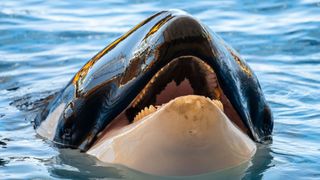
An orca has attacked a yacht off the coast of Scotland, U.K. — the first time this behavior has been recorded beyond Portuguese and Spanish waters. One expert believes it's a sign the boat-ramming behavior may have "leapfrogged" to a different orca population.
The orca ( Orcinus orca ) in Scotland repeatedly slammed into the boat's stern, where Wim Rutten, who was the only person on the boat, had attached a fishing line to catch mackerel.
Rutten said the orca seemed to be "looking for the keel," which is the part of the boat that orcas in Iberian waters have also targeted with ruthless efficiency . "Maybe he just wanted to play," Rutten told The Guardian . "Or look me in the eyes. Or to get rid of the fishing line."
Iberian orcas, a small and endangered population of about 39 animals, have sunk three boats in the last 18 months and damaged over 100 more by ramming into boats and ripping off their rudders. Some experts think an adult female named White Gladis may have survived a traumatic event — such as a boat collision or entrapment in a fishing net — that flipped a behavioral switch and triggered the first attacks.
Scientists have identified 13 orcas — 11 juveniles, White Gladis and another adult called Grey Gladis — that participate in these encounters and, in some cases, follow the boats all the way to port after breaking their rudders.
Related: Mystery orcas with bulbous heads wash up dead in unexplained mass stranding
The behavior appears to be spreading through social learning, with orcas imitating each other and reproducing acts they deem advantageous or interesting in some way, Alfredo López Fernandez , a biologist and representative of the Grupo de Trabajo Orca Atlántica, or Atlantic Orca Working Group (GTOA), previously told Live Science.
Sign up for the Live Science daily newsletter now
Get the world’s most fascinating discoveries delivered straight to your inbox.
The latest incident, which occurred on Monday (June 19) off the Shetland Islands in the North Sea, may suggest orcas in the area have acquired the skill from their southern European neighbors.
"It's possible that this 'fad' is leapfrogging through the various pods/communities," Conor Ryan , a scientific adviser to the Hebridean Whale and Dolphin Trust, told The Guardian. (A fad is a behavior initiated by one or two individuals, which others adopt through social learning and then abandon.)
Although 2,000 miles (3,200 kilometers) separate orcas in the North Sea from the Iberian population, there might be "highly mobile pods that could transmit this behavior a long distance," Ryan said.
Experts with the GTOA suspect the attacks are linked to human activities at sea. Fishing, noise pollution and boat traffic, "even in an indirect way, are the origin of this behavior," López Fernandez told The Guardian.
The traumatic experience that may have sparked attacks off the Iberian coast was "perhaps related to a fishing boat while hunting tuna,'' Mónica González, a marine biologist working with the GTOA, told Yachting Monthly .
— Grisly new footage shows orcas attacking a great white shark and eating its liver
— 2 orcas slaughter 19 sharks in a single day in South Africa, eating their livers and leaving them to rot
— Orca males are burnouts who let their moms do all the hunting, surprising study finds
Every year, Atlantic bluefin tuna ( Thunnus thynnus ) pass through the Strait of Gibraltar on their migration path from spawning sites in the Mediterranean Sea to feeding grounds in the eastern Atlantic, according to a report by the European Parliament.
Encounters with orcas could be linked to these migrations, González said.
Bluefin tuna were overfished from the 1980s until 2010, but stocks have now recovered, according to the report. Nevertheless, experts think orcas may perceive boats as a threat to their food supply and survival.
"We think that the other orcas are juveniles and are copying [White Gladis'] behavior because she is an adult and they think that as an adult 'we need to do this to survive,'" González said.

Sascha is a U.K.-based trainee staff writer at Live Science. She holds a bachelor’s degree in biology from the University of Southampton in England and a master’s degree in science communication from Imperial College London. Her work has appeared in The Guardian and the health website Zoe. Besides writing, she enjoys playing tennis, bread-making and browsing second-hand shops for hidden gems.
Brutal footage shows orca mom and son team up to drown another pod's calf
Dying orca's final moments after 'desperate' effort to stay afloat captured in 1st of its kind footage
Hurry, the solar eclipse is fast approaching, but not a soon as the end of this excellent Unistellar deal
Most Popular
By Patrick Pester March 25, 2024
By Keumars Afifi-Sabet March 25, 2024
By Katherine Kornei, Eos.org March 25, 2024
By Meg Duff March 25, 2024
By John Swierk March 24, 2024
By Owen Jarus March 24, 2024
By Jamie Carter March 24, 2024
By Sara Reardon March 24, 2024
By Marlowe Starling March 24, 2024
By Venki Ramakrishnan March 23, 2024
By Megan Shersby March 23, 2024
- 2 Mass grave of plague victims may be largest ever found in Europe, archaeologists say
- 3 India's evolutionary past tied to huge migration 50,000 years ago and to now-extinct human relatives
- 4 1,900-year-old coins from Jewish revolt against the Romans discovered in the Judaen desert
- 5 Dying SpaceX rocket creates glowing, galaxy-like spiral in the middle of the Northern Lights
- 2 Speck of light spotted by Hubble is one of the most enormous galaxies in the early universe, James Webb telescope reveals
- 3 8-hour intermittent fasting tied to 90% higher risk of cardiovascular death, early data hint
- 4 Beluga whales appear to change the shape of their melon heads to communicate, scientists discover
- 5 Brutal footage shows orca mom and son team up to drown another pod's calf
Orca Rams Into Yacht Near Scotland As Boat-Bashing Behavior Seems To Spread North

Deputy Editor, Trends, HuffPost

A man sailing a yacht in the North Sea near Scotland’s Shetland Islands said that an orca repeatedly rammed into his boat earlier this week, exhibiting behavior that’s been recently seen in killer whales farther south.
Retired Dutch physicist Dr. Wim Rutten was alone on a 7-ton yacht on Monday when an orca smacked into the boat’s stern, then circled back to hit it again and again “at fast speed,” he told The Guardian .

The published Guardian interview did not mention any permanent damage to the vessel, just “soft shocks” felt through the hull.
“Maybe he just wanted to play,” Rutten, who was mackerel fishing when the orca showed up, speculated. “Or look me in the eyes. Or to get rid of the fishing line.”
His account bore a striking similarity to dozens of incidents reported this year in waters near Portugal and Spain. Last month, orcas broke the rudder and pierced the hull of a sailing boat near the coast of southern Spain, necessitating a rescue team to tow the vessel to a port. Three weeks prior, also off the Spanish coast, an orca trio rammed into and ultimately sank a yacht . No human deaths have occurred in any of the reported incidents.
Dr. Alfredo López Fernandez, a biologist who authored a paper published last year on the phenomenon, believes the incidents originated with a female orca known to scientists as White Gladis. The theory goes that White Gladis had a traumatic encounter involving a boat and started to behave defensively against other boats, and her fellow orcas picked up the behavior.
Not all scientists agree that’s what likely happened, though.
“What I think is probably happening is it’s a playful behavior. It’s a social behavior,” Dr. Deborah Giles, science director at research and advocacy group Wild Orca, told Vice News .
Giles suspects a young orca started playfully ramming boats, and others followed suit.
Aside from the behavior’s origin, another question is whether it’s now spreading to northern waters or is arising there independently.
Orca researcher Dr. Conor Ryan told The Guardian that it’s plausible that “highly mobile” orca pods are spreading the behavior northward.
“It’s possible that this ‘fad’ is leapfrogging through the various pods/communities,” he said.
The incidents have inspired a huge amount of largely supportive jokes and memes about an orca uprising. But Monica Bacchus, marine programs coordinator at National Fish and Wildlife Foundation’s Killer Whale Research and Conservation Program, told Vice that she doesn’t think what’s happening is an actual cetacean revolution. But she does find the phenomenon intriguing.
She said, “It’s always cool to see animals do new things.”
Support HuffPost
Our 2024 coverage needs you, your loyalty means the world to us.
At HuffPost, we believe that everyone needs high-quality journalism, but we understand that not everyone can afford to pay for expensive news subscriptions. That is why we are committed to providing deeply reported, carefully fact-checked news that is freely accessible to everyone.
Whether you come to HuffPost for updates on the 2024 presidential race, hard-hitting investigations into critical issues facing our country today, or trending stories that make you laugh, we appreciate you. The truth is, news costs money to produce, and we are proud that we have never put our stories behind an expensive paywall.
Would you join us to help keep our stories free for all? Your contribution of as little as $2 will go a long way.
As Americans head to the polls in 2024, the very future of our country is at stake. At HuffPost, we believe that a free press is critical to creating well-informed voters. That's why our journalism is free for everyone, even though other newsrooms retreat behind expensive paywalls.
Our journalists will continue to cover the twists and turns during this historic presidential election. With your help, we'll bring you hard-hitting investigations, well-researched analysis and timely takes you can't find elsewhere. Reporting in this current political climate is a responsibility we do not take lightly, and we thank you for your support.
Contribute as little as $2 to keep our news free for all.
Dear HuffPost Reader
Thank you for your past contribution to HuffPost. We are sincerely grateful for readers like you who help us ensure that we can keep our journalism free for everyone.
The stakes are high this year, and our 2024 coverage could use continued support. Would you consider becoming a regular HuffPost contributor?
The stakes are high this year, and our 2024 coverage could use continued support. If circumstances have changed since you last contributed, we hope you’ll consider contributing to HuffPost once more.
Already contributed? Log in to hide these messages.
Popular in the Community
From our partner, more in environment.
- Skip to main content
- Skip to primary sidebar
- Skip to footer

DIVE Magazine
Scuba Diving Luxury Travel Magazine
Orca attacks yacht off Shetland
24 June 2023 2 minutes
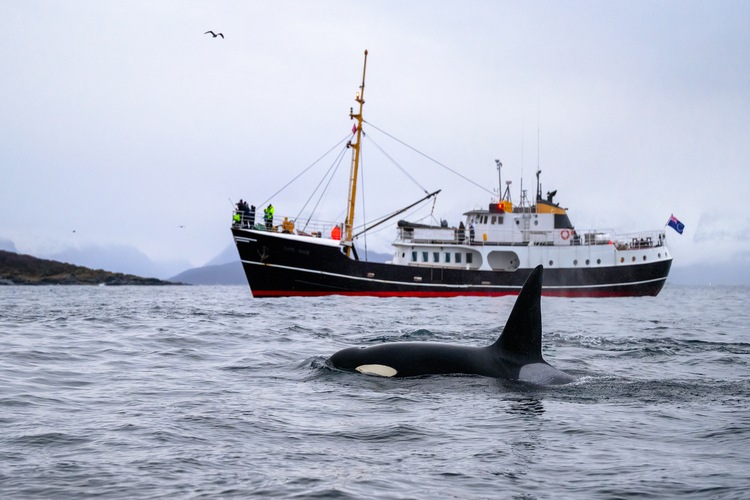
Unusual orca behaviour off Scotland draws comparisons with spate of attacks in Strait of Gibraltar
By Victoria Heath
An orca continually rammed into a yacht off Scotland’s Shetland Isles in the North Sea – the first reported incident of its kind in northern waters. The unusual behaviour has been compared to the recently highlighted spate of more than 250 incidents in three years in the Strait of Gibraltar and Portugal.
The vessel, sailing from Lerwick to Bergen, Norway, was manned by Dr Wim Rutten, a 72-year-old retired Dutch physicist who was fishing for mackerel with a single line before the orca hit the yacht’s stern.
‘What I felt [was] most frightening was the very loud breathing of the animal,’ Rutten said. ‘The orca stayed behind the boat looking for the keel. Then he disappeared … but came back at fast speed, twice or thrice … and circled a bit.’
Related articles
- Study explains why Orcas are attacking boats in the Strait of Gibraltar
- The orcas causing boat attacks in the Strait of Gibraltar
- Continued predation of great white sharks by orcas
- Life Changing: Todd Thimios’ stunning Norway orca photography
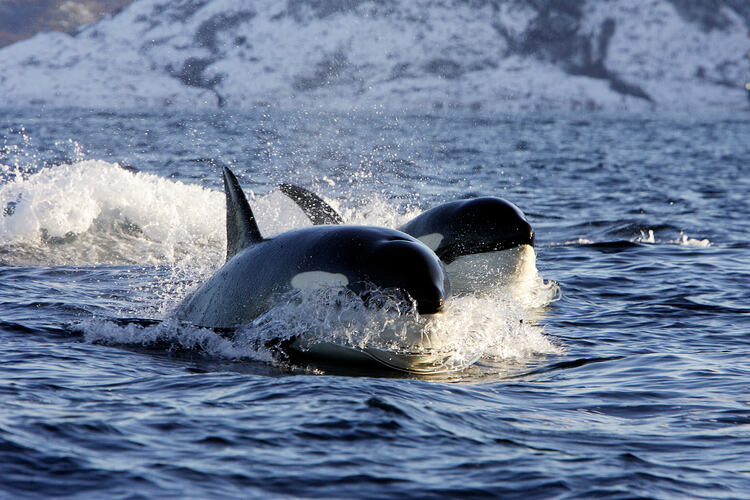
The behaviour of attacking boats has been a regular occurrence in the Strait of Gibraltar and off Portugal, where scientists have theorised a number of reasons for the attacks – including an injury sustained by a boat to an orca known as ‘White Gladis’, who in turn may have triggered a behavioural change in other orcas in the Strait of Gibraltar subpopulation.
Only last month, three orcas attacked a Swiss sailing yacht off the coast of Gibraltar, damaging it so severely that the crew were forced to abandon ship before the vessel sank.
Although the Strait of Gibraltar subpopulation is more than 2000 miles away from where the Shetland attack took place, Dr Conor Ryan, scientific advisor to the Hebridean Whale and Dolphin Trust , does not rule out the possibility that these orcas may have picked up the behaviour from the far-away orcas. Ryan theorises that there may be ‘highly mobile pods that could transmit this behaviour a long distance’.
‘‘I’d be reluctant to say it cannot be learned from [the southern population],’ Ryan continues. ‘It’s possible that this ‘fad’ is leapfrogging through the various pods/communities.’
- Latest Posts
- Orca attacking adult whale shark to eat its liver - 3 August 2023
- ‘The Deepest Breath’ freediving documentary on Netflixnow - 28 July 2023
- Freediver bitten by oceanic whitetip shark - 27 July 2023
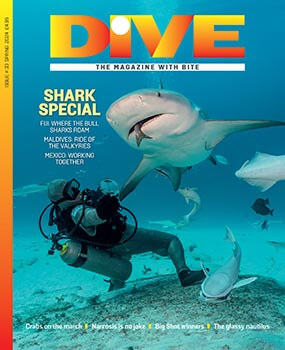
FOLLOW DIVE
Want to access DIVE on your tablet or smartphone? Press the Apple, Android or PC/Mac image below to download the app for your device

More from DIVE
- Advertise with DIVE Magazine
- Terms & Conditions
- Privacy Policy
Yachting Monthly
- Digital edition

Orca ‘rams yacht’ off Shetland as close encounters spread to North Sea
- Heather Prentice
- June 21, 2023
An orca has repeatedly rammed a yacht off the coast of Shetland in the North Sea in a dramatic development that sees orca attacks on yachts for the first time outside the Iberian peninsula, where orca attacks have been reasonably common...

Orca off Shetland, where the most recent incident took place. Photo: Getty / David O'Brien
Dr Wim Rutten, a 72-year-old retired Dutch physicist was sailing alone from Lerwick to Bergen when an orca appeared and hit the back of the aluminium hulled, seven tonne boat, the Guardian reported. At the time Dr Rutten was fishing for mackerel and had a line out of the back of the boat.
Dr Rutten told the Guardian that the orca hit again and again creating ‘soft shocks’ through the aluminium hull. The orca stayed behind the boat, he said, ‘looking for the keel. Then he disappeared … but came back at a fast speed, twice or three times … and circled a bit’
Scientists have said that juvenile orcas ‘attacking’ yachts off the Iberian coast could be imitating the behaviour of one individual adult orca named White Gladis . Orcas have now sunk three yachts off the Iberian coast in the past 18 months and close encounters have been reported with over 100 other yachts in increasingly aggressive behaviour.
‘Our theory is that this orca, White Gladis, had an “adverse moment”, perhaps related to a fishing boat while hunting tuna. We think that this orca had an incident and that she is trying to stop all boats,’ biologist Monica Gonzalez told Yachting Monthly .
‘We think that the other orcas are juveniles and are copying her behaviour because she is an adult. They think that (this is adult behaviour) and “we need to do this to survive”’, said Gonzalez, who works with CEMMA, the Spanish NGO group that coordinates the study of marine mammals and is part of the working group of the Groupo Trabajo Orca Atlantica (GTOA).
Article continues below…

Juvenile orcas imitate White Gladis, attacking yachts off the Iberian peninsula
Juvenile orcas attacking sailing yachts could be imitating the behaviour of one individual adult orca named White Gladis, scientists believe.…

Encounters with orcas & how to protect your boat
Andy Pag explores why orcas have been damaging yachts off Spain, Portugal and Gibraltar, and how to protect your boat
The group of orcas involved in the encounters around the Iberian peninsula appears to number 13 juveniles and two adults – the other named Grey Gladis – out of a larger group of 39. ‘Gladis is not training the juveniles,’ said Gonzalez, and is not necessarily present at every attack.
Often the orca prefer to swim in smaller groups of up to 6. The orca interactions with boats appears to be linked to the migration of tuna exiting the Mediterranean through the Strait of Gibraltar and heading west and north around the Iberian Peninsula into the Bay of Biscay.
‘The behaviour of orcas varies wildly: sometimes it is a single orca that approaches or sometimes they come in a group and sometimes it appears that adults are standing off and directing juveniles,’ said John Burbeck, orca project leader at the Cruising Association.
‘Sometimes the orcas also come at the yacht with a violent blow and cause significant damage immediately or sometimes a group of orcas come in and play with the boat for an extended period of up to 90 minutes.’
Although most encounters between orcas and yachts are harmless, scientists are struggling to explain the orcas’ increasingly aggressive behaviour. Orcas are intelligent, social creatures that can easily learn and reproduce behavioural patterns.
Data from the Cruising Association, which works alongside Spanish and Portuguese scientists at the GTOA, shows that the number of orca incidents has increased in the last few months. ‘In the first three months of this year, there has been a dramatic increase (16 incidents as opposed to 2 last year),’ said Burbeck. ‘In May, with 10 incidents reported, it has already exceeded the total for last year and it doesn’t look like it is going to let up. May has been very, very busy.’
In 2022, there were 132 interactions with orca, with 99 yachts damaged and two sinking, data from the CA showed. There were also 256 uneventful passages. Around 25% of the damaged yachts needed to be towed to port.
The latest yacht to be fatally struck was on the night of May 4 off the coast of Barbate, Cadiz, when three orcas left the yacht Alboran Champagne without a rudder and taking on water, causing the four crew to abandon ship. The Spanish coastguard towed the yacht but it sank before reaching port.
‘Our first advice is to avoid the orcas,’ said John Burbeck. ‘To avoid interactions, stay less than two miles off shore and navigate in less than 20 metres of water.’
The GTOA operates a traffic light information system on orca sightings on its website . There are also two apps: GT Orca and Orcinus which give information. A Facebook page Orca Attack Reports gives information as does Orca Discussions on Telegram.
The CA this month launched an updated orca information portal and is urging all sailors to report interactions and safe passages via the portal.
Orca Repeatedly Attacked a Yacht Off the Coast of Scotland; First Attack in Northern Waters Raises Concerns of Spreading Trend
In a rare occurrence, an orca aggressively slammed a yacht navigating the North Sea near Scotland, indicating a potential expansion of orca attacks in the area. Wim Rutten, a retired Dutch physicist and the captain of the yacht, expressed his fear in an interview with The Guardian of the powerful animal's loud breathing during the unsettling encounter.
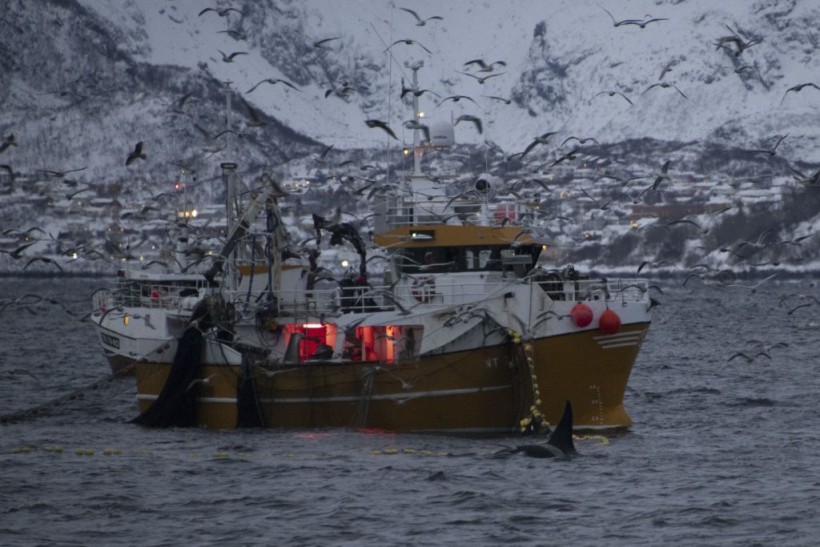
Orcas Terrorizing Boats
In the interview, the retired physicist and captain of the yacht described how the orca stayed behind the boat before disappearing and then returning at a faster speed, circling him. Rutten felt "soft shocks" created by the mammal as it made contact with the aluminum hull of the yacht.
Rutten immediately made a connection to the recent orca attacks along the Spanish and Portuguese coasts, particularly in the Strait of Gibraltar. Last month alone, USA Today reported 20 orca incidents in those waters, and there have been instances of orcas sinking three boats in Southern Europe since the previous summer.
As per Futurism , the majority of recent orca attacks have been concentrated in the seas south of Spain, specifically the Strait of Gibraltar, as killer whales cause distress to sailors in the past month. However, the incident involving Rutten marks the first reported case of an orca attack in the Northern Waters.
Rutten speculated on the motives behind the orca's behavior, suggesting that it may have wanted to play, establish eye contact, or remove a fishing line. The unusual and escalating encounters between orcas and humans or their vessels have only been documented since 2020, with over 500 reported orca boat interactions between 2020 and 2023, as reported by the Atlantic Orca Working Group.
READ ALSO: Why Are Killer Whales Attacking Boats? Orcas Attacking Sailboats on European Coasts
It Might Be a Fad: Killer Whales Influencing Others to Attack Boats
Scientists suspect that the recent trend of orca attacks on boats may be the result of learned behavior being spread within orca pods. The behavior initially observed in the Strait of Gibraltar has now been reported as far north as Scotland, leading researchers to believe that it is being taught and transmitted among different communities.
Social animals like orcas are known to pick up behaviors from one another, similar to human fads, according to Live Science . For example, in 1987, orcas in Puget Sound started wearing dead salmon as hats, which spread through different pods.
Dolphins, another social cetacean, have also been observed exhibiting fads, such as tail walking, after one dolphin had the opportunity to witness it in a rehabilitation center.
In the Pacific, orcas have been playing with crab pots, while in Europe, they appear to be targeting boat rudders. The exact reason behind this behavior is still uncertain, but it is speculated that the orcas might be attracted to the sensation of water being moved by a boat propeller. It is also suggested that the attacks could be driven by the curiosity and playfulness of juvenile males.
Scientists believe that as the orcas mature and enter their adult life, they will likely outgrow these behaviors and the attacks on boats will cease. They consider the incidents to be a form of playful interaction rather than aggressive intent.
Check out more news and information on Whales on Science Times.
Most Popular

Saudi Arabia's First Female Humanoid Robot Embodies Country's Values As It Is Trained To Not Discuss Forbidden Topics
![orca attacks yacht scotland Women More Prone To Develop Nicotine Addiction, Less Successful at Quitting Due To Brain Circuitry [Study]](https://1721181113.rsc.cdn77.org/data/thumbs/full/52805/89/56/50/40/women-more-prone-to-develop-nicotine-addiction-less-successful-at-quitting-due-to-brain-circuitry-study.jpg)
Women More Prone to Develop Nicotine Addiction, Less Successful at Quitting Due to Brain Circuitry [Study]

Most Powerful Geomagnetic Storm in Years Led to Auroras Lighting the Sky Across the Globe

UFOs Hover Over Mexican Oil Rig, Alleged Underwater Alien Base Unearthed

Chemicals in Common Household Products Could Cause Detrimental Effects on Brain Health, Increase Risk for Neurological Disorders
Latest stories.

How to Know if Your Solar Glasses Are Legit Not Counterfeit Ahead of the Anticipated Total Eclipse?

Sailor’s Eyeball Blob: How Big Is the Largest Single-Celled Organism on Earth?

Dark Matter May Produce Exploding Stars Powered by Weakly Interacting Massive Particles, Study Reveals

Intuitive Machine's Odie Ends First Private Moon-Landing Mission

Subscribe to The Science Times!
Sign up for our free newsletter for the Latest coverage!
Recommended Stories

Probing Europa: NASA's Instrument Set To Detect Potential Signs of Life on Jupiter's Icy Moon

Devil Comet Might Appear During the Anticipated Total Solar Eclipse


2 of Milky Way's Earliest Building Blocks Determined Using ESA's Gaia

James Webb Space Telescope to Investigate Auroras at Distant Planets Saturn, Uranus
- Skip to main content
- Keyboard shortcuts for audio player
Revenge of the killer whales? Recent boat attacks might be driven by trauma
Scott Neuman

Killer whales are pictured during a storm in the fjord of Skjervoy in 2021 off the coast of northern Norway. Researchers say orcas are stepping up "attacks" on yachts along Europe's Iberian coast. Olivier Morin/AFP via Getty Images hide caption
Killer whales are pictured during a storm in the fjord of Skjervoy in 2021 off the coast of northern Norway. Researchers say orcas are stepping up "attacks" on yachts along Europe's Iberian coast.
Scientists and sailors say orcas, also known as killer whales, are stepping up "attacks" on yachts along Europe's Iberian coast, with one skipper who's been pursued by the marine mammals on two separate occasions suggesting that their tactics are becoming more stealthy.
Delivery skipper Dan Kriz, who had to be towed into port after orcas destroyed the rudder on a boat he was on in 2020, had an almost identical experience in April.
"My first reaction was, 'Please! Not again,'" Kriz told Newsweek .
Unlike last time, the orcas made a stealthier approach without the characteristic squeaks they normally use to communicate, he says. They made quick work of the two rudders on the catamaran Kriz was delivering. "Looks like they knew exactly what they are doing. They didn't touch anything else," he said.
View this post on Instagram A post shared by Catamaran Guru (@catamaranguru)
Most marine scientists have characterized hundreds of encounters between boats and orcas that have sunk at least three vessels and damaged dozens of others over the years as a "fad," implying that the animals will eventually lose interest and resort to more typical behavior.

Killer whales are 'attacking' sailboats near Europe's coast. Scientists don't know why
But if that's the case, there are few signs this behavior is going out of style anytime soon. According to a June 2022 study published in the journal Marine Mammal Science , orcas have stepped up the frequency of their interactions with sailing vessels in and around the Strait of Gibraltar, the busy waterway that links the Mediterranean Sea with the Atlantic Ocean.
Some researchers think it's merely playful behavior
As NPR first reported last August, many scientists who study orca behavior believe these incidents — in which often one or more of the marine mammals knock off large chunks of a sailboat's rudder — are not meant as attacks, but merely represent playful behavior.
One hypothesis put forward by Renaud de Stephanis, president and coordinator at CIRCE Conservación Information and Research, a research group based in Spain, is that orcas like the feel of a boat's rudder.
"What we think is that they're asking to have the propeller in the face," de Stephanis told NPR last year. "So, when they encounter a sailboat that isn't running its engine, they get kind of frustrated and that's why they break the rudder."

A picture taken on May 31 shows the rudder of a vessel damaged by killer whales ( Orcinus orca ) while sailing in the Strait of Gibraltar and taken for repairs at the Pecci Shipyards in Barbate, near Cadiz, southern Spain. Jorge Guerrero/AFP via Getty Images hide caption
A picture taken on May 31 shows the rudder of a vessel damaged by killer whales ( Orcinus orca ) while sailing in the Strait of Gibraltar and taken for repairs at the Pecci Shipyards in Barbate, near Cadiz, southern Spain.
In another recent encounter, Werner Schaufelberger told the German publication Yacht that his vessel, Champagne, was approached by "two smaller and one larger orca" off Gibraltar.
"The little ones shook the rudder at the back while the big one repeatedly backed up and rammed the ship with full force from the side," he said.
The Spanish coast guard rescued Schaufelberger and his crew, towing Champagne to the Spanish port of Barbate, but the vessel sank before reaching safety.
The encounters could be a response to past trauma
Since 2020, there have been more than 500 encounters between yachts and orcas in the area, according to one of the study's co-authors, Alfredo López Fernandez, a biologist at the University of Aveiro in Portugal and a representative of the Grupo de Trabajo Orca Atlántica , or Atlantic Orca Working Group.
López Fernandez believes that a female known as White Gladis, who leads the group of around 40 animals, may have had a traumatizing encounter with a boat or a fishing net. In an act of revenge, she is teaching her pod-mates how to carry out revenge attacks with her encouragement, researchers believe.

A worker cleans Champagne, a vessel that sank after an attack by orcas in the Strait of Gibraltar and was taken for repairs at the Pecci Shipyards in Barbate, near Cadiz, southern Spain, on May 31. Jorge Guerrero/AFP via Getty Images hide caption
A worker cleans Champagne, a vessel that sank after an attack by orcas in the Strait of Gibraltar and was taken for repairs at the Pecci Shipyards in Barbate, near Cadiz, southern Spain, on May 31.
"The orcas are doing this on purpose, of course, we don't know the origin or the motivation, but defensive behavior based on trauma, as the origin of all this, gains more strength for us every day," López Fernandez told Live Science .
It's an intriguing possibility, says Monika Wieland Shields, director of the Orca Behavior Institute .
"I definitely think orcas are capable of complex emotions like revenge," she says. "I don't think we can completely rule it out."
However, Shields is not ready to sign on to the "revenge" hypothesis just yet. She says that despite humans having "given a lot of opportunities for orcas to respond to us in an aggressive manner," there are no other examples of them doing so.
Deborah Giles, the science and research director at Wild Orca, a conservation group based in Washington state, is also skeptical of the hypothesis. She points out that killer whale populations in waters off Washington "were highly targeted" in the past as a source for aquariums. She says seal bombs, small charges that fishers throw into the water in an effort to scare sea lions away from their nets, were dropped in their path while helicopters and boats herded them into coves.
"The pod never attacked boats after that," she says. "It just doesn't ring true to me."
Shields says it's important to remember that whatever the motive is for the behavior of the orcas off the Iberian coast, it isn't being transmitted to pods in other parts of the world.
"We've had folks here in Washington [asking] 'is it safe to go out in the water here with these orcas?'" she says. "While this is kind of an ongoing situation in that specific place, I don't think there's any reason to think it's going to start spreading to other populations of orcas."
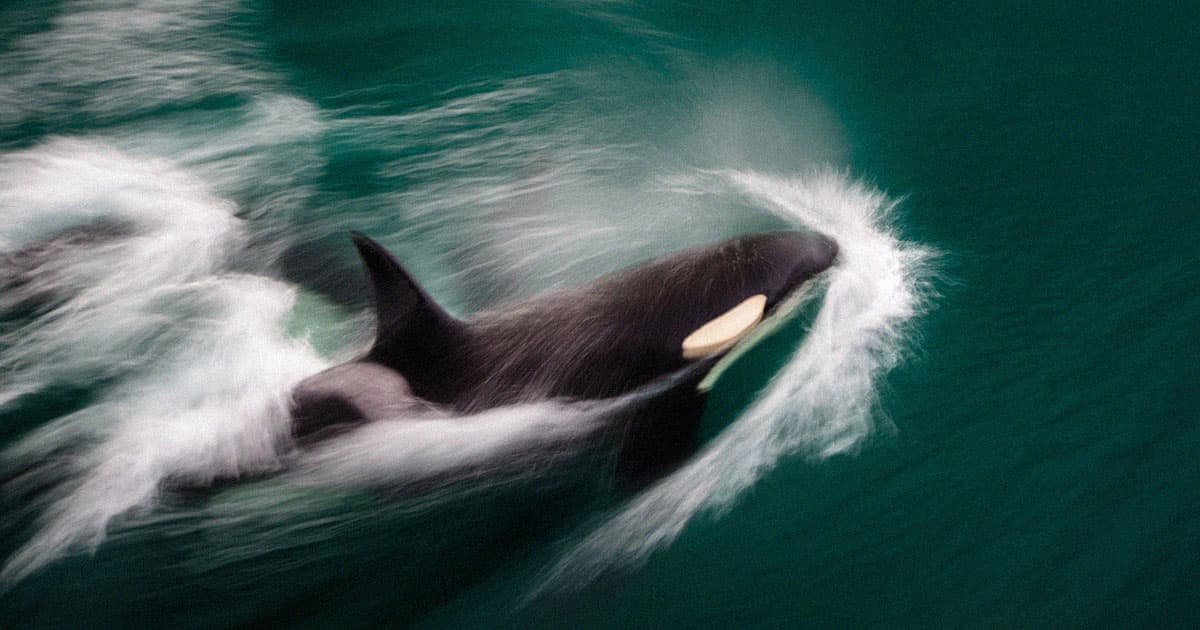
Relentless Orca Repeatedly Rams Yacht
"what i felt [was] most frightening was the very loud breathing of the animal.", things go north.
An orca repeatedly slammed into a yacht sailing in the North Sea off the coast of Scotland earlier this week, marking the first orca attack in northern waters.
In other words, the recent onslaught of orca attacks on ships , it seems, could be spreading.
"What I felt [was] most frightening was the very loud breathing of the animal," Wim Rutten, a retired Dutch physicist who was captaining the ship, told The Guardian .
The orca rammed the boat over and over, sending "soft shocks" through the hull. Once it stopped its assault, the whale dropped back and ominously trailed the vessel, "looking for the keel."
The whale "disappeared," Rutten described, "but came back at fast speed, twice or thrice… and circled a bit."
Attacking Spree
Killer whales have been terrorizing sailors for over a month. But until now, most if not all of the dozens of recent orca attacks on boats have been roughly contained to the seas south of Spain, in an area known as the Strait of Gibraltar.
Recently released footage shows an orca slamming into a sailboat off Spain's southern coast, damaging the hull and forcing sailors to pump water out of the boat.
The behavior is as unusual as it is terrifying. Until aggressive encounters were first documented back in 2020 , orcas had been rarely known to approach, let alone attack, humans or their vessels. It was only in recent months that those burgeoning encounters escalated to sinking ships .
Orcas, like many whales, are incredibly social and intelligent creatures . Scientists suspect that the behavior is being taught by adults to their pods, and then spreading. The behavior moving from the Strait of Gibraltar all the way north of Scotland is quite a stretch, but some scientists say it's entirely possible.
"I'd be reluctant to say it cannot be learned from [the southern population]," Conor Ryan, a marine biologist and a scientist advisor for the Hebridean Whale and Dolphin Trust, told The Guardian .
"It's possible that this 'fad' is leapfrogging through the various pods/communities."
Just a Phase
As for the origin of the orca behavior and the intentions behind it, scientists have several theories. It could be that this is just an apex predator's idea of having fun. Rutten himself said it was possible the orca "just wanted to play."
Another prevailing theory is that this originated as an act of revenge, but some experts dispute this thinking.
As Ryan alluded to earlier, this could simply be a behavioral "fad." How long it will stay in fashion, though, remains to be seen.
More on orcas: Captain Attacked Twice by Orcas Says They're Developing Better Anti-Boat Strategies
Share This Article
DISCLAIMER(S)
Articles may contain affiliate links which enable us to share in the revenue of any purchases made.
Registration on or use of this site constitutes acceptance of our Terms of Service.
© Recurrent Ventures Inc, All Rights Reserved.
UK Edition Change
- UK Politics
- News Videos
- Paris 2024 Olympics
- Rugby Union
- Sport Videos
- John Rentoul
- Mary Dejevsky
- Andrew Grice
- Sean O’Grady
- Photography
- Theatre & Dance
- Culture Videos
- Food & Drink
- Health & Families
- Royal Family
- Electric Vehicles
- Lifestyle Videos
- UK Hotel Reviews
- News & Advice
- Simon Calder
- Australia & New Zealand
- South America
- C. America & Caribbean
- Middle East
- Politics Explained
- News Analysis
- Today’s Edition
- Home & Garden
- Fashion & Beauty
- Travel & Outdoors
- Sports & Fitness
- Sustainable Living
- Climate Videos
- Behind The Headlines
- On The Ground
- Decomplicated
- You Ask The Questions
- Binge Watch
- Travel Smart
- Watch on your TV
- Crosswords & Puzzles
- Most Commented
- Newsletters
- Ask Me Anything
- Virtual Events
- Betting Sites
- Online Casinos
- Wine Offers
Thank you for registering
Please refresh the page or navigate to another page on the site to be automatically logged in Please refresh your browser to be logged in
Could the spate of mysterious killer whale boat attacks be spreading beyond Gibraltar?
A puzzling new interaction has been reported off the coast of shetland, writes andy gregory, article bookmarked.
Find your bookmarks in your Independent Premium section, under my profile
Killer whales have sunk three ships near Gibraltar, according to one expert

Sign up to the Independent Climate email for the latest advice on saving the planet
Get our free climate email, thanks for signing up to the independent climate email.
A pod of orcas and their suspected ringleader, a matriarch named Gladis , are gaining increasing notoriety for repeatedly ramming into boats in the Strait of Gibraltar , conjuring somewhat romantic images of a long-overdue fightback by the natural world.
While the reality is far murkier, what is clear is that killer whales have been interacting with human vessels to an extent not previously reported, at times with terrifying consequences.
In one of several harrowing encounters, a sailing yacht named Alboran Champagne sank as its crew watched on from lifeboats, after damage inflicted by multiple orcas ramming into the vessel miles from the Spanish coastline caused it to flood.
That was one of at least 20 interactions last month alone, in a phenomenon that has perplexed scientists since boats first began to report orchestrated “sledgehammer”-like treatment by killer whales in the region in July 2020.
While some experts have previously floated theories that the endangered pod’s behaviour could be related to food scarcity, the disruptive resumption of business-as-usual nautical activities post-pandemic, or even playful, scientists have recently begun to suggest a link to past trauma.
- Gladis the killer whale and her gang of orcas, out for revenge in Gibraltar
- Moment killer whale rips off catamaran’s rudder with its teeth
Some experts believe a matriarch named White Gladis may have suffered a “critical moment of agony”, such as colliding with a boat or becoming entrapped during illegal fishing, which altered her behaviour in a “defensive” fashion – and she may inadvertently have been teaching others to do the same.
“That traumatised orca is the one that started this behaviour of physical contact with boats,” Dr Alfredo Lopez Fernandez, of Aveiro University told Live Science , after several shaken crews described smaller orcas copying a larger matriarch in ramming their ships’ rudders and keels.
Most interactions are harmless, but three vessels have sunk so far, Dr Fernandez said last month, while 250 boats are reported to have been damaged .
While the behaviour has so far been limited to the Iberian coast, in a further perplexing development this week a retired Dutch physicist and experienced sailor reported being rammed by an orca some 1,750 miles away, off the coast of Shetland , Scotland.
Dr Wim Rutten was sailing from Lerwick to Bergen, Norway, and fishing for mackerel when the orca collided with the stern of his seven-tonne yacht.
“I said: ‘s***!’”, the 72-year-old told The Guardian , adding: “What I felt [was] most frightening was the very loud breathing of the animal.”
The orca then stayed behind the boat “looking for the keel”, said Mr Rutten, who was already aware of the incidents near Gibraltar. “Then he disappeared but came back at fast speed, twice or thrice and circled a bit. Maybe he just wanted to play. Or look me in the eyes. Or to get rid of the fishing line.”
Given the isolated nature of the incident, and lack of identifiable images or footage of the animal, experts have been wary to make a link between the encounter and the ongoing phenomenon near Gibraltar.
“There were a number of pods of orca around Shetland on that day as is a fairly regular occurrence at this time of year, that were identified as part of the ‘inshore’ population,” Karen Hall, a marine ecology adviser to NatureScot told The Independent .
“It’s possible that one of the lesser known offshore orca, which follow the mackerel and herring fisheries, tried to steal fish and got too close to the boat.”
Noting that the behaviour exhibited in southern Europe “seems to be limited to specific individuals and may be linked to the tuna fishery”, Ms Hall added: “This could be the result of a previous interaction or any other reason, but there’s no way of knowing.”
Speaking of Mr Rutten’s encounter, she said: “We can’t be sure of the details of this incident, as there are no photos or video and we have not heard of any other incidents in the Shetland area or elsewhere in Scotland. As a result, we aren’t even able to identify the species involved with certainty, nor if the whale was part of a pod involved in incidents in Gibraltar or part of any known orca photo ID catalogues.”
But another expert suggested it was possible that the incidents were connected, given that there may be “highly mobile pods that could transmit this behaviour a long distance”.
Dr Conor Ryan, a scientific adviser to the Hebridean Whale and Dolphin Trust, told The Guardian : “I’d be reluctant to say it cannot be learned from [the southern population]. It’s possible that this ‘fad’ is leapfrogging through the various pods/communities.”
- Killer whale threw British sailor’s yacht around ‘like rag doll’ in latest attack
- 'Killer whale apocalypse': Banned chemical pollutants could wipe out species, study finds
However, Professor Peter Evans told The Independent it was “pretty unlikely” that an orca from Gibraltar had travelled to Shetland, as its population derives from Iceland. While these orcas range over large areas, between Iceland and Scotland, and Norway and the Hebrides, his Sea Watch Foundation is not aware of any orcas migrating from Gibraltar.
But he added: “Still, it cannot be ruled out.”
Describing the theory of orcas inadvertently learning from Gladis’s trauma as “plausible”, he said there was a “possibility that this learned behaviour has been passed on to others” but “they would need to have been in contact with one another”.
“This is unlikely in the case of any such interaction with another community of orcas,” he said.
Join our commenting forum
Join thought-provoking conversations, follow other Independent readers and see their replies
Subscribe to Independent Premium to bookmark this article
Want to bookmark your favourite articles and stories to read or reference later? Start your Independent Premium subscription today.
New to The Independent?
Or if you would prefer:
Want an ad-free experience?
Hi {{indy.fullName}}
- My Independent Premium
- Account details
- Help centre
Orcas Won't Stop Attacking Boats. They Officially Have Our Attention.
Another killer whale has attacked a yacht in Spain, prompting some to wonder if orcas are teaching their young to ram boats.
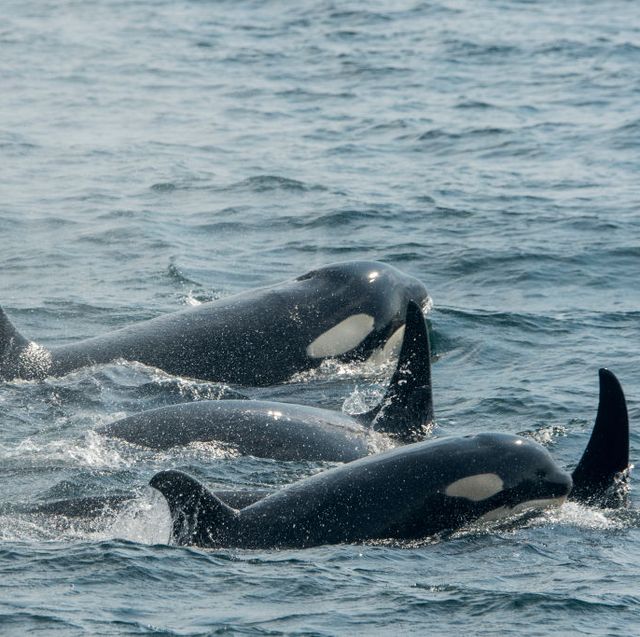
- For the past 18 months, orcas have been attacking boats and yachts in the Mediterranean Sea near the Strait of Gibraltar.
- A new report of an orca boat attack in the North Sea near Scotland is a surprising development.
- It's possible that the orcas are displaying “cultural evolution” and other pods are learning behaviors from one another
Now, the majestic orca ( Orcinus orca ) is under scrutiny for the same kind of behavior, as boats in the Mediterranean near the Strait of Gibraltar—and surprisingly, off the coast of Scotland in the North Sea—appear to be specifically targeting boats. Although this behavior was well-known in the Iberian orca population, it’s a shocking development that orcas seemingly unaffiliated with the Mediterranean pod are exhibiting similar behaviors.
“I’d be reluctant to say it cannot be learned from [the southern population],” Conor Ryan, a scientist who’s studied orca pods off the Scottish coast, told The Guardian . “It’s possible that this ‘fad’ is leapfrogging through the various pods/communities.”
Despite being known as “killer whales,” orcas are actually members of the dolphin family and are highly sociable, using complex vocalizations to communicate with one another. The learn matrilineally, meaning “grandmother” orcas (which can live for 80 years or more) become matriarchs of their pods and pass on vital hunting skills.
With three boats sunk and upwards of 100 others damaged in Iberia, scientists think that this behavior may come from one such “grandmother” orca named White Gladis . The thought is that she may have survived a traumatic event earlier in life involving a boat, and has since taught her pod how to attack them. It’s also possible that these attacks are timed with Atlantic bluefin tuna ( Thunnus thynnus ) migrations , and the orcas perceive boats as competition for food.
Of course, humans are not necessarily innocent victims in these orca hit-and-runs, as boats cause noise pollution and other hazards for the creatures and other marine life. But, regardless, how exactly did an orca in the North Sea learn this seemingly isolated behavior from 2,000 miles away? Some scientists think that highly mobile pods could be capable of teaching these boat-destroying tricks to individuals in other pods.
So, will orcas always be on the hunt for boats and yachts of all shapes and sizes? Well, not necessarily. As seemingly easy as it was for the orcas to pick up this hunting trick, it’s possible that this “cultural evolution” will disappear just as rapidly. Similars shifts have happened before. For example, the website Salon reports that, a few years back, bottlenose dolphins were carrying sea sponges on their noses of the coast of Australia . But as quickly as this “fad” appeared, it became scarce, and soon disappeared entirely.
Scientists don’t know how long this particular “cultural evolution” will stick around. But considering our bang-up job protecting the planet, it almost feels like there’s a measure of justified cosmic karma at play here.
Darren lives in Portland, has a cat, and writes/edits about sci-fi and how our world works. You can find his previous stuff at Gizmodo and Paste if you look hard enough.

.css-cuqpxl:before{padding-right:0.3125rem;content:'//';display:inline;} Animals .css-xtujxj:before{padding-left:0.3125rem;content:'//';display:inline;}

49 Killer Whales Are Reshaping the Ocean

Rancher Used Exotic DNA to Create a Super Sheep
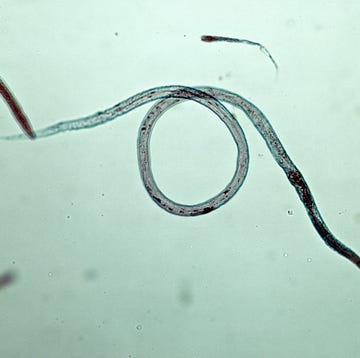
Chernobyl Worms Seem to Have Conquered Radiation

A Newly Created Superpig Is Here to Save Our Bacon
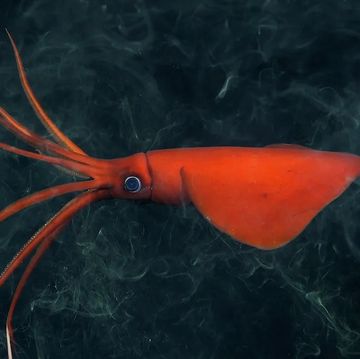
Scientists Just Discovered 100 New Life Forms

The Wolves of Chernobyl Have Evolved
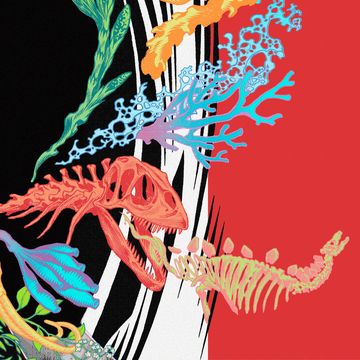
A Feast for the (Geologic) Ages
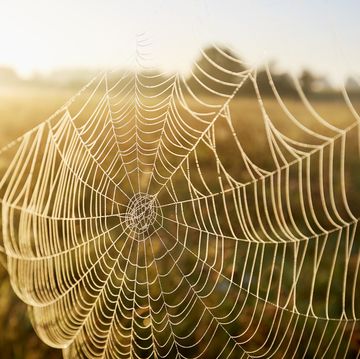
Spiderwebs Are a Lifeline for Endangered Species
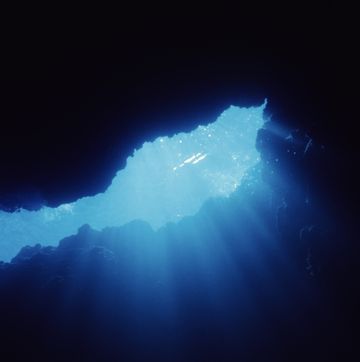
4 Black Eggs Have Surfaced From the Deep Ocean

Some Animals Are Desperately Turning Nocturnal

Scientists Cloned A Monkey. Now It’s All Grown Up.
Premium Content
Rogue orcas are thriving on the high seas—and they’re eating big whales
A fourth type of Pacific killer whale may live miles offshore from California and Oregon, preying on whales, other dolphins, and sea turtles.

Most orcas tend to stick to coastlines, from the Antarctic dwellers that make waves to knock seals off ice floes to the liver-extracting brothers around Cape Town . But now, scientists have found what could be a brand-new population of killer whales: Animals that ply the high seas, hunting large whales and other sizable prey.
These open-ocean denizens have been spotted at numerous locations far from Oregon and California, many of them well beyond the continental shelf, where waters can reach depths of 15,000 feet, according to a recent study in Aquatic Mammals .
“There haven’t been any real studies, at least in the North Pacific, looking at killer whales in the open ocean,” says study leader Josh McInnes , a master’s candidate at the University of British Columbia’s Institute for the Oceans and Fisheries.
“It was kind of a shock when … we saw animals that were out in this open ocean habitat and were completely different from the other ecotypes we know.”
Killer whales in the Pacific are grouped into three ecotypes: Residents, which live close to shore and eat salmon and other fish; offshores, which live farther out and also eat fish; and transients, also called Bigg’s, the only orcas previously known to eat mammals. (See 13 fantastic photos of orcas.)
Scientists could not match the 49 whales in the new study with any known orcas through photos and descriptions, which are based on their unique dorsal fins and saddle patches, the gray or white pattern on an orca's back.
This means the animals are either a subgroup of the transient ecotype or an entirely unique population, says McInnes, who is also a research associate with the Pacific Wildlife Foundation.
The team could also differentiate the population, dubbed the oceanics, from other known orcas due to scars or bite marks from the parasitic cookie-cutter shark, which only occur in the deep ocean.

Beyond individual variations, the oceanics don't look like other known ecotypes, for example sporting a large gray saddle patch or no saddle patch at all.
“The open ocean doesn’t support a lot of large predators; it’s often described as a giant desert, so we weren’t expecting to find so many different animals, so we’re excited to carry on more research,” McInnes says.
“We really just don't know yet what is happening with the killer whales in the open ocean. This is the mystery behind what we hope to do next.”
Following the prey
Our knowledge of orcas living in the open ocean is limited, as it’s difficult to find the widely distributed animals in a boat.
Yet the recent paper, a mixture of literature review and new observations, discovered nine instances in which marine mammal researchers, fishermen, and tourists observed whales in the northern Pacific Ocean between 1997 and 2021.
In the first documented incident, researchers watched a large pod of killer whales attack a herd of nine adult female sperm whales, managing to separate one from the pack and kill it. Other pods also hunted and ate an elephant seal, a pygmy sperm whale, a Risso’s dolphin, and a leatherback sea turtle.
With detailed records from each such encounter, the researchers plotted geo-referenced locations, determined water depth, and compared photos in databases to determine that the 49 whales sighted could potentially be a new ecotype.
It’s possible that this new population formed as prey drew them farther from shore.

“Mammal-eating killer whales are doing well, and their numbers are increasing as seal and other whale populations have rebounded since whaling and sealing became illegal,” says Robert Pitman , a marine ecologist at Oregon State University’s Marine Mammal Institute, who wasn’t involved in the study.
While prey overall is less abundant in deep-sea waters, killer whales may still find that habitat is more appealing than competing with the larger populations of resident whales closer to shore, he says. (Watch video: sperm whales vs. orcas.)
To this end, McInnes and colleagues hope this study will spark efforts to document the new whale population through genetic sampling, satellite tagging, acoustic tracking, further photo identification, and additional field observation.
Climate change is affecting some populations of killer whales , such as those in Antarctica, which depend on seals that live on the rapidly decreasing ice. On the U.S. West Coast, a decline in salmon has reduced a population off Puget Sound , Washington.
Worldwide, however, the species is thriving, and coming more into contact with people in coastal areas. Orcas ramming and even sinking boats off Spain made headlines in 2023, with some people rooting for the animals as fighting back against human domination .
“Killer whales are probably the most widely distributed vertebrate on the planet. They are everywhere,” Pitman says.
With many tourist cruises available worldwide, he encourages everyone to put seeing a killer whale, whose males can reach lengths of 27 feet, on their bucket list.
“This is the biggest apex predator we have on the planet today. We haven't seen anything like it since dinosaurs roamed the Earth.”
Related Topics
- ORCA (KILLER WHALE)
- ANIMAL ATTACKS
- SPERM WHALE
You May Also Like

Orcas are killing porpoises—but not eating them. Why?
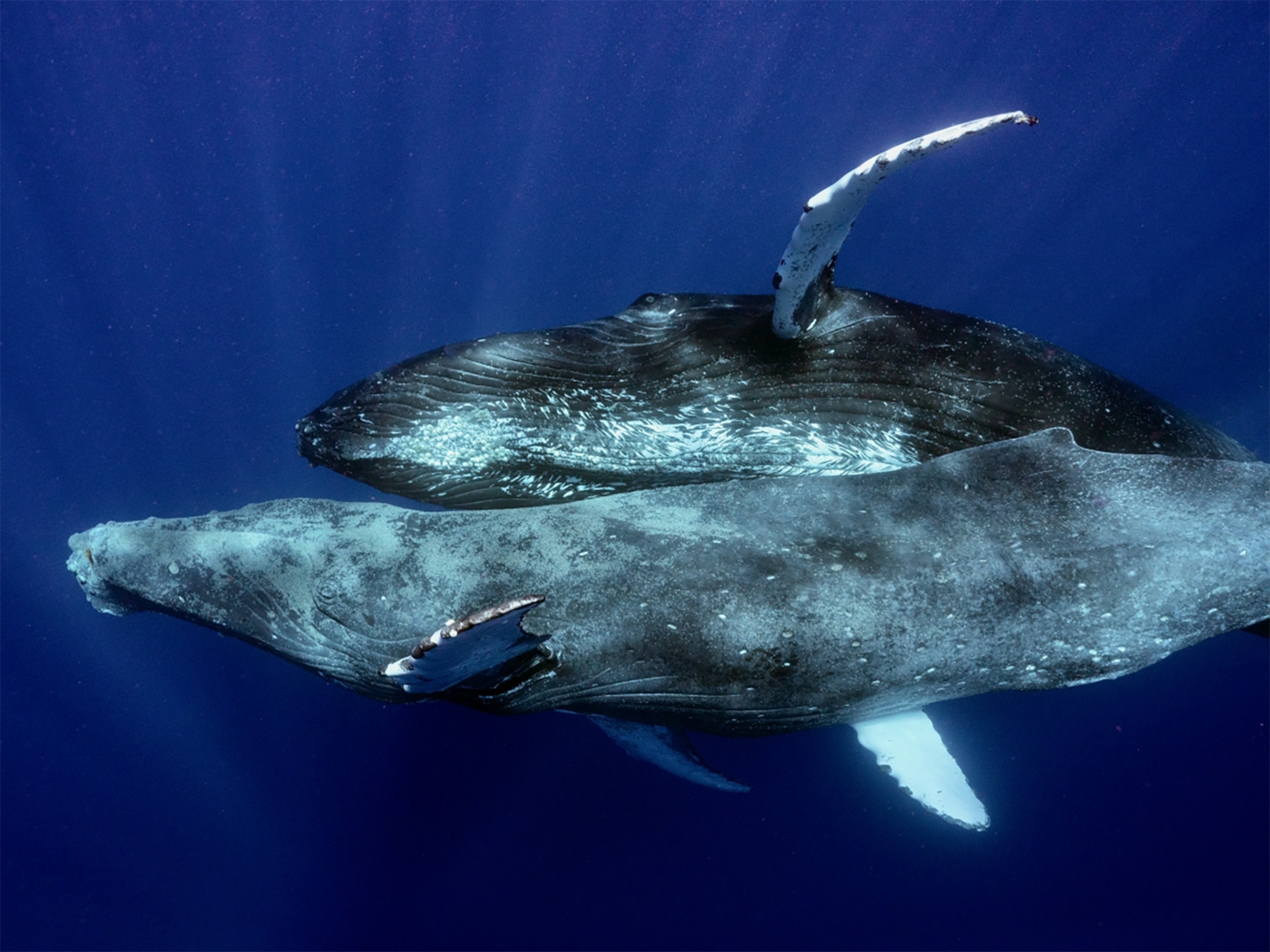
First-ever photos show humpback whales mating—and they’re males
Single orca seen killing great white shark for first time ever

This video captures a rarely seen sperm whale birth. It’s beautiful.

Menopause is very rare among animals. Here’s why orcas go through it.
- Photography
- Environment
- Paid Content
History & Culture
- History & Culture
- History Magazine
- Women of Impact
- Mind, Body, Wonder
- Terms of Use
- Privacy Policy
- Your US State Privacy Rights
- Children's Online Privacy Policy
- Interest-Based Ads
- About Nielsen Measurement
- Do Not Sell or Share My Personal Information
- Nat Geo Home
- Attend a Live Event
- Book a Trip
- Inspire Your Kids
- Shop Nat Geo
- Visit the D.C. Museum
- Learn About Our Impact
- Support Our Mission
- Advertise With Us
- Customer Service
- Renew Subscription
- Manage Your Subscription
- Work at Nat Geo
- Sign Up for Our Newsletters
- Contribute to Protect the Planet
Copyright © 1996-2015 National Geographic Society Copyright © 2015-2024 National Geographic Partners, LLC. All rights reserved
- International edition
- Australia edition
- Europe edition
Chinese ‘state-affiliated’ organisations behind cyber-attacks on MPs and Electoral Commission, Dowden says – as it happened
Deputy PM says international partners, including the US, will also be making statements today about similar Chinese cyber-attacks. This live blog is closed
- Chinese hackers targeted UK’s Electoral Commission and politicians, say security services
- 1d ago Early evening summary
- 1d ago Home Office accepts recommendations in Angiolini report on treating indecent exposure more seriously
- 1d ago Stride tells MPs DWP will 'fully and properly' consider report saying Waspi women should get compensation
- 1d ago Vaughan Gething plays down prospect of M4 relief road plan being revived
- 1d ago Dowden dismisses Labour questions about Cameron's China links as 'desperate stuff'
- 1d ago Dowden says goverment still trying to reach agreement on whether to submit China to 'enhanced' scrutiny under National Security Act
- 1d ago Dowden describes anti-China measures as a 'first step' after being urged to call Beijing as 'threat'
- 1d ago Dowden says cyber-attacks show 'clear and persistent pattern' of 'hostile intent' from China
- 1d ago Oliver Dowden tells MPs Chinese 'state-affiliated' organisations behind cyber-attacks on Electoral Commission and on MPs
- 1d ago Sunak facing fresh byelection challenge after Scott Benton resigns as MP before recall petition closes
- 1d ago Gove apologises over 'minor' breach of Commons rules relating to VIP football match tickets not declared in register
- 1d ago No 10 insists it remains committed to leasehold reform following reports plan to axe ground rents in jeopardy
- 1d ago No 10 accepts £100,000 a year is a high salary, while defending Jeremy Hunt over his claims suggesting it isn't
- 1d ago Energy minister Andrew Bowie says government's investment in nuclear power should have happened 'years ago'
- 1d ago Sunak insists UK has 'very strong' capabilities to resist cyber-attacks
- 1d ago Sunak announces investment worth more than £200m over 10 years for Barrow
- 1d ago Lib Dems say it's 'outrageous' Cameron won't take questions from Commons as whole, but will speak to Tory MPs in private
- 1d ago How serious was Electoral Commison cyber-attack being blamed on China?
- 1d ago Home Office launches social media campaigning to try to deter people in Vietnam from entering UK illegally on small boats
- 1d ago Labour says its Great British Energy company would prioritise floating offshore energy
- 1d ago UK ‘slow to hold China to account’ for cyber-attacks against MPs and voters
- 1d ago Government urged to end its ‘naivety on China’ as Dowden to brief MPs on Beijing’s role in cyber-attacks

Oliver Dowden tells MPs Chinese 'state-affiliated' organisations behind cyber-attacks on Electoral Commission and on MPs
Oliver Dowden , the deputy PM, is making his Commons statement. He says it is about malicious cyber activity directed at the UK by actors affiliated to the Chinese state.
He says Chinese state-affiliated actors have been involved in two cyber-attacks on the UK: the hacking of the Electoral Commission , and attacks aimed at parliamentarians.
He says international partners, including the US, will be making statements today about similar Chinese cyber-attacks they have suffered.
Early evening summary
Chinese state-backed hackers were responsible for two “malicious” digital campaigns targeting the UK’s democratic institutions and politicians, the security services have found.
Rishi Sunak is to face another tricky byelection in the coming weeks after the former Conservative backbencher Scott Benton quit parliament before the conclusion of a recall petition among his constituents.
Mel Stride, the work and pensions secretary, has been criticised by campaigners for giving a non-committal response in the Commons to the report saying the government should pay compensation to the Waspi women. (See 5.26pm .) The chair of Women Against State Pension Inequality (Waspi), Angela Madden, responded to what he said with this statement:
The secretary of state now says this matter is so complex, he needs yet more months and years of head scratching to sort it out. He has made much of the report being 100 pages long as if he were being asked to digest War and Peace . The fact it is has taken five years for the ombudsman to produce his conclusions is a pretty perverse reason to say more delay is now justified. The report is not complicated at all. He says that 1950s-born women should be compensated and that Parliament should intervene to make a scheme happen. Every day 111 of the affected women die waiting for justice. The Commons must get a debate and vote on compensation as soon as possible after Easter.
Labour’s plan for state-backed offshore windfarms will be a “gamechanger”, Keir Starmer has said, as the party seeks to regain the initiative on green policy after the slow-motion ditching of its £28bn investment pledge.
Michael Gove breached standards rules by failing to register hospitality he enjoyed with a Conservative donor whose company was awarded personal protective equipment contracts during the Covid pandemic, parliament’s sleaze watchdog has found.

Murdo Fraser , a Conservative MSP, has threatened to take legal action against Police Scotland after a tweet he posted comparing choosing to identify as non-binary to “choosing to identify as a cat” was logged as a hate incident, the BBC reports.
Home Office accepts recommendations in Angiolini report on treating indecent exposure more seriously
The Home Office has announced that it is accepting the recommendations in the report from Dame Elish Angiolini last month into the events leading up to the rape and murder of Sarah Everard by a police officer. They include calling for a public campaign “to raise awareness that indecent exposure and sending unsolicited photographs of genitals amounts to criminality”.
The Conservatives have had to remove an online video attacking Labour’s record on crime in London after it was pointed out to them that the video they were using was from New York, Kevin Schofield from HuffPost UK reports.
NEW: The Tories have been forced to delete a Labour attack video about crime in London after it featured a scene showing chaos at Penn Station in ... er New York. pic.twitter.com/NQm6EA5tNy — Kevin Schofield (@KevinASchofield) March 25, 2024
Stride tells MPs DWP will 'fully and properly' consider report saying Waspi women should get compensation
In the Commons Mel Stride , the work and pensions secretary, is giving a statement about the report from the Parliamentary and Health Service Ombudsman (PHSO) published on Thursday saying the goverment should pay compensation to women who lost out because the government did not adequately communicate the fact that a decision was taken in the 1990s to raise the age at which they would start getting the state pension. These are the so-called Waspi women, named after the campaign called Women Against State Pension Inequality.
The PHSO said its compensation plan could cost up to £10.5bn (campaigners claim this isn’t enough, and that a more generous compensation scheme is needed) and on Thursday the government just said it would consider the recommendations, without committing to compensation of any kind.
In his statement Stride said very little that went beyond this. He said the PHSO did not criticise the decision to raise the state pension age for women, and he said that women involved did not suffer a “direct” financial loss from the decision taken by the DWP. But it did find the DWP did not publicise the forthcoming changes as well as it should have done, he said.
The government would “fully and properly consider the findings” in the report, he said.
Vaughan Gething plays down prospect of M4 relief road plan being revived
Keir Starmer and Vaughan Gething , the new first minister of Wales, gave a brief interview to WalesOnline today while they were on their visit to Holyhead. According to the write-up , much of it consisted the two leaders giving slightly evasive answers about the prospect of the plan to build an M4 relief road in south Wales being revived.
When Mark Drakeford was first minister, he ruled out the idea on environmental grounds.
At the weekend Ken Skates , the new transport secretary in Gething’s cabinet, gave an interview implying there could be a rethink in relation to some road schemes that have been blocked. He was fairly clear that the M4 relief road plan would not be resurrected (“I just can’t see that happening – the cost would just be astronomical”). But David TC Davies , the Welsh secretary, responded to the Skates interview by claiming that if money were the only problem, Westminster might be willing to help out – thereby implying this could be an election issue.
Starmer and Gething both stressed to WalesOnline that they wanted more infrastructure investment in Wales , while not saying anything to suggest that an M4 relief road would be on their list. “David TC Davies may say he wants to sit down and talk to us but that isn’t the relationship we find with the UK government,” Gething said.
Carol Monaghan (SNP) asks about the threat posed by electric cars manufactured in China to the UK.
Dowden says cars would have to meet UK safety standards. And he says the government can block investments on security grounds.
Back in the Commons Vicky Ford (Con) says she is very concerned about the physical safety of MPs. She says on Friday last week the security guards she was advised to have at her constituency surgery did not turn up. That was the second time this year this has happened, she says.
Dowden says the government takes threats to MPs exceptionally seriously. He says he will take his issue up.

Chris Law (SNP) asks why anyone can trust the government when it has been “far too late” responding to the threat from China .
Dowden does not accept that. He says he has consistently warned about the threat from China.
Dowden dismisses Labour questions about Cameron's China links as 'desperate stuff'
Stephen Kinnock (Lab) asks about David Cameron’s visit to Sri Lanka to back a Chinese investment scheme. He says the Foreign Office has not replied to Freedom of Information requests about this. Will Dowden ensure it does?
Dowden says this is “pretty desperate stuff”. He goes on:
Trying to link Chinese cyber-attacks to our our current foreign secretary just doesn’t wash.
Here is our story on the Dowden announcement by Pippa Crerar and Eleni Courea.
- Politics live with Andrew Sparrow
- Conservatives
- Rishi Sunak
- Keir Starmer
Comments (…)
Most viewed.

IMAGES
COMMENTS
An orca hit a seven-ton yacht carrying a 72-year-old multiple times on Monday off the Shetland Islands in Scotland, the sailor told The Guardian. Retired Dutch physicist Dr Wim Rutten said he was ...
Orca attacks on boats appear to be 'leapfrogging' across oceans as a yacht is rammed by killer whale north of Scotland. Orcas in Norway. An orca repeatedly rammed a yacht in the Shetland Islands ...
Orca attacks yacht near Scotland, 1st such incident in northern waters. By Kathryn Mannie Global News Posted June 23, 2023 3:01 pm. Updated July 22, 2023 9:40 pm. 3 min read.
ORCA ATTACK: A killer whale is filmed ripping the rudder blade off of a boat sailing off the coast of Gibraltar, the latest in a series of incidents that have seen the predators targeting ocean ...
An orca repeatedly rammed a yacht in the North Sea off Shetland on Monday, in a concerning development following previous interactions between the cetaceans and vessels in the strait of Gibraltar ...
An orca has attacked a yacht off the coast of Scotland, U.K. — the first time this behavior has been recorded beyond Portuguese and Spanish waters. One expert believes it's a sign the boat ...
A man sailing a yacht in the North Sea near Scotland's Shetland Islands said that an orca repeatedly rammed into his boat earlier this week, exhibiting behavior that's been recently seen in killer whales farther south. Retired Dutch physicist Dr. Wim Rutten was alone on a 7-ton yacht on Monday when an orca smacked into the boat's stern ...
An orca continually rammed into a yacht off Scotland's Shetland Isles in the North Sea - the first reported incident of its kind in northern waters. The unusual behaviour has been compared to the recently highlighted spate of more than 250 incidents in three years in the Strait of Gibraltar and Portugal. The vessel, sailing from Lerwick to ...
An orca has repeatedly rammed into a boat in the North Sea off the coast of Scotland's Shetland Islands. The attack on Monday comes after a growing number of interactions between orcas and ...
A killer whale has repeatedly rammed a yacht off the coast of Scotland, it has emerged, in an attack reminiscent of those seen 3,000 miles further south near Gibraltar. The orca is said to have ...
Heather Prentice. June 21, 2023. An orca has repeatedly rammed a yacht off the coast of Shetland in the North Sea in a dramatic development that sees orca attacks on yachts for the first time outside the Iberian peninsula, where orca attacks have been reasonably common... Orca off Shetland, where the most recent incident took place.
Orca live in family units called pods (stock pic) (Image: PA) A sailor has told how his yacht was repeatedly rammed by an Orca off the coast of Scotland. Dr Wim Rutten, a 72-year-old retired Dutch ...
In a rare occurrence, an orca aggressively slammed a yacht navigating the North Sea near Scotland, indicating a potential expansion of orca attacks in the area.
Terrifying footage has emerged of the moment a pod of orcas descended on a British couple's yacht - and proceeded to spend the next hour ramming the vessel.J...
The operator said the orcas would probably lose interest after 10 minutes - but they continued to attack the 12 tonne boat for 45 minutes. Image caption, Mr and Mrs Walker feared they might have ...
Killer whales are pictured during a storm in the fjord of Skjervoy in 2021 off the coast of northern Norway. Researchers say orcas are stepping up "attacks" on yachts along Europe's Iberian coast ...
An orca repeatedly slammed into a yacht sailing in the North Sea off the coast of Scotland earlier this week, marking the first orca attack in northern waters. In other words, the recent onslaught ...
The latest orca attack took place off the coast of Scotland. As Philip Hoare and Jeroen Hoekendijk reported for The Guardian , the orca's behavior toward the boat it attacked was similar to the way orcas have attacked boats near Spain and Portugal — just thousands of miles away.
While these orcas range over large areas, between Iceland and Scotland, and Norway and the Hebrides, his Sea Watch Foundation is not aware of any orcas migrating from Gibraltar. But he added ...
For the past 18 months, orcas have been attacking boats and yachts in the Mediterranean Sea near the Strait of Gibraltar. A new report of an orca boat attack in the North Sea near Scotland is a ...
Orcas ramming and even sinking boats off Spain made headlines in 2023, with some people rooting for the animals as fighting back against human domination. "Killer whales are probably the most ...
Tourists on a boat in Australia were left stunned as they watched a pod of orcas chase and attack a group of sperm whales. A rare video shows the "titans of the ocean" battling. Naturaliste ...
Oliver Dowden tells MPs Chinese 'state-affiliated' organsiations behind cyber-attacks on Electoral Commission and on MPs Oliver Dowden , the deputy PM, is making his Commons statement.